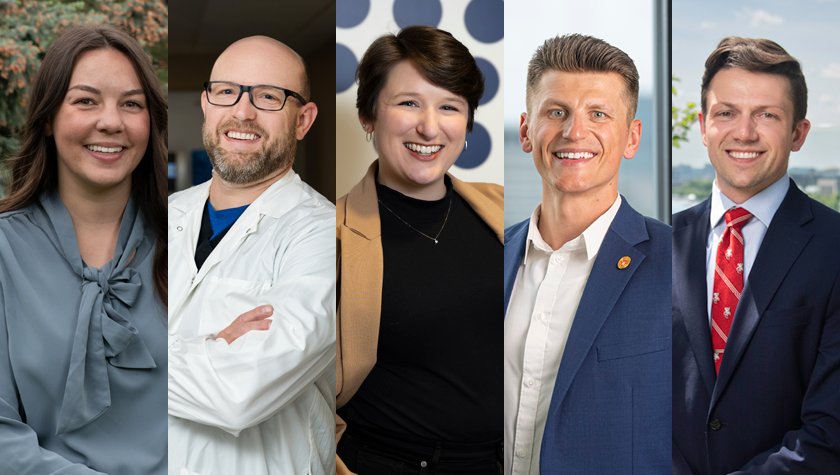
Meet five recent graduates shaping the systems and science that power modern health care
By Jessica Steinhoff
Now in its fifth year, Five of the Future showcases alumni who are making bold moves early in their careers, representing each of the University of Wisconsin–Madison School of Pharmacy’s five major degree programs: Bachelor of Science in Pharmacology and Toxicology (PharmTox), Doctor of Pharmacy (PharmD), Master of Science in Health-System Pharmacy Administration and Leadership (HSPAL), PhD in Health Services Research in Pharmacy (HSRP), and MS or PhD in Pharmaceutical Sciences (PharmSci).
Whether in health care policy, scientific discovery, or community leadership, these graduates are driving change across the pharmacy profession — and beyond.
This year’s honorees are improving access to care in rural Wisconsin, pushing the boundaries of pharmacy education, shaping Medicaid policy, advancing cell-based delivery systems, and building precision medicine programs from the ground up. All five are taking on complex challenges and finding innovative ways forward.
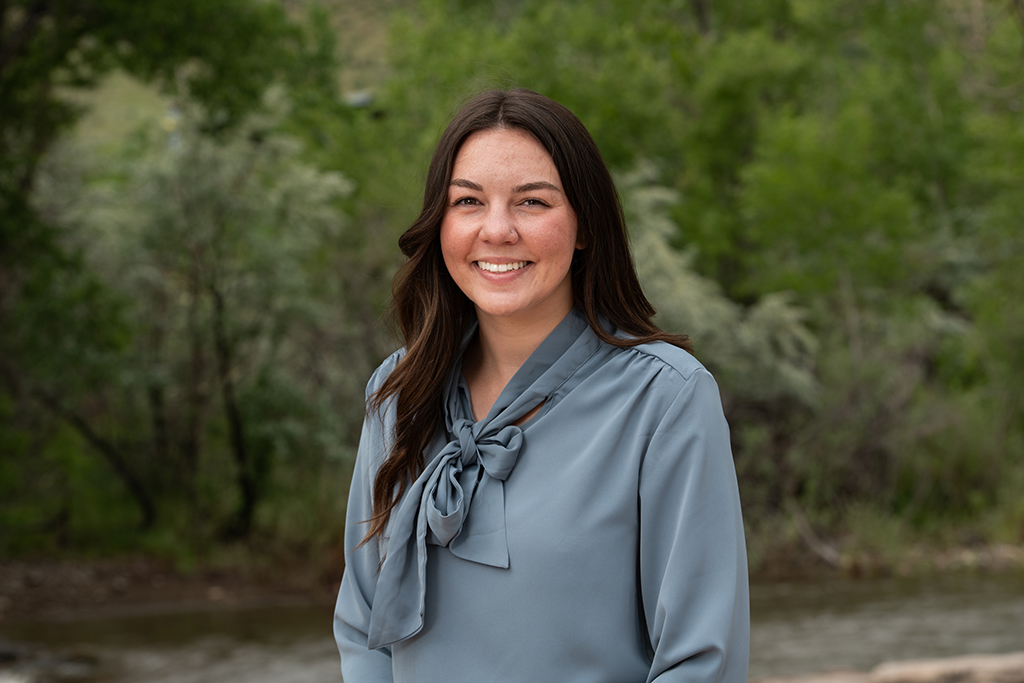
Location: Golden, Colorado
Position/Employer: Senior Associate, Strategy & Growth, Facktor
Claim to Fame: Translating complex health policy details into accessible language and action steps
Proudest moment: “Earning the trust of my colleagues early in my career. They count on me to communicate what’s going on in policy environments, which helps them better serve community health centers.”
Inspiration: "Improving access to healthcare. Everyone deserves to get the care they need, when they need it, regardless of their financial situation."
Amanda Nelsen (BS ’21) remembers how she felt when she learned that some Americans forego groceries to pay for their medications.
“I was really young at the time, but I knew that prescription access and affordability mattered to me. Getting insulin or an EpiPen shouldn’t be hard. Plus, the cost of care goes down when people get the primary and preventive care they need instead of forgoing care and later ending up in an emergency room,” she says.
Nelsen took a deeper dive into these issues through one of the UW’s first-year interest groups (FIGs), where she met like-minded students considering careers in medicine and pharmacy. She started considering these paths, too.

“PharmTox felt like the right match for my skills and interests at the time, and some great mentors at the School of Pharmacy pushed me in the direction I needed to go to succeed,” she says.
For Nelsen, this road led to dual master’s degrees in public health and public affairs through the University of Texas in 2024. Shortly after graduation, she joined Facktor, a health care consulting firm, where she’s now a senior associate. In this role, Nelsen distills technical knowledge from the world of health care policy into key takeaways for a range of stakeholders. These include Facktor colleagues and the company’s main clients: community health centers.
“I tell them what’s happening in Congress and how it’s impacting community health centers,” Nelsen says. “I also help these health centers write grants, create strategic plans, and assess their departmental operations for optimization.”
Though many people in the health care policy space have studied public health or public affairs, having a deep understanding of how drugs and diseases work is rare. Nelsen’s PharmTox training gives her an edge.
“These health centers do so much for their patients and communities. It’s inspiring to watch, which keeps me going at work each day.”
—Amanda Nelsen
“The UW PharmTox program helped me learn about the scientific piece of health care, which informs the systems perspective I use now,” Nelsen says. “I understand how expensive and complex different parts of our health care system are, which is useful when thinking about how to make improvements and shape policy.”
This knowledge was also valuable during internships with the U.S. Government Accountability Office and the Texas Association of Community Health Centers, which helped Nelsen hone her specialized communication skills. The building blocks, however, came from PharmTox coursework.
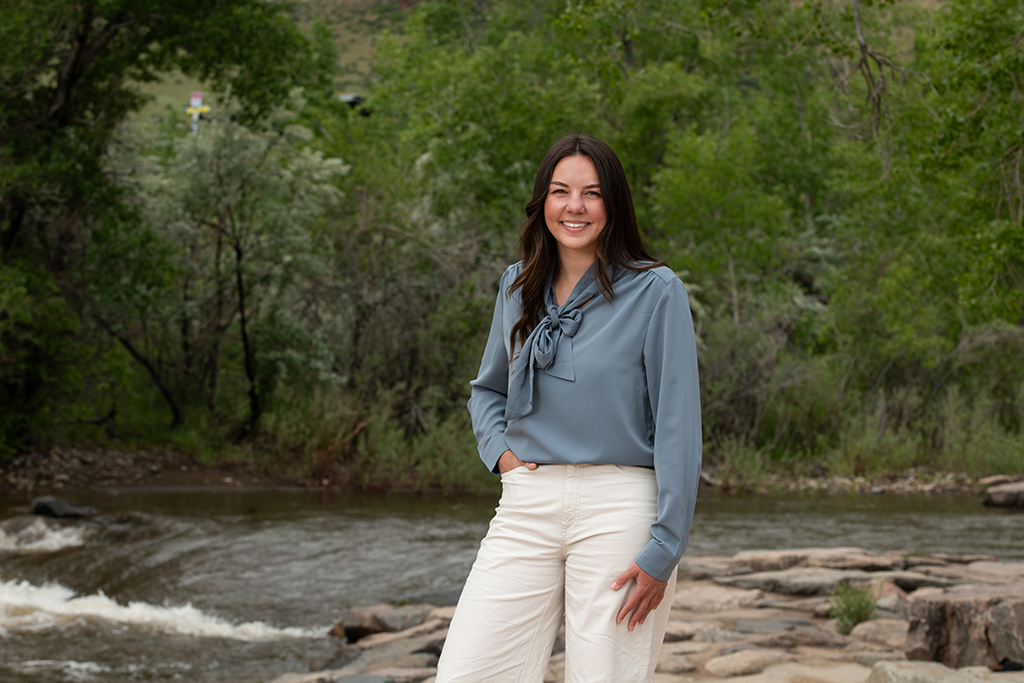
“The report-writing skills I learned in the PharmTox program have served me extremely well,” she says. “One of the first things I learned is that a wide audience needs to understand what you’re writing about, even if the subject is very complicated.”
Nelsen also uses her scientific acumen to find clinically relevant facts and biases in policy-related materials. This helps her tailor communications to the needs of different stakeholders – for example,
health care providers, leadership teams, and finance staff, three groups whose information needs can differ.
“These health centers do so much for their patients and communities. It’s inspiring to watch, which keeps me going at work each day,” Nelsen says.
Back to top
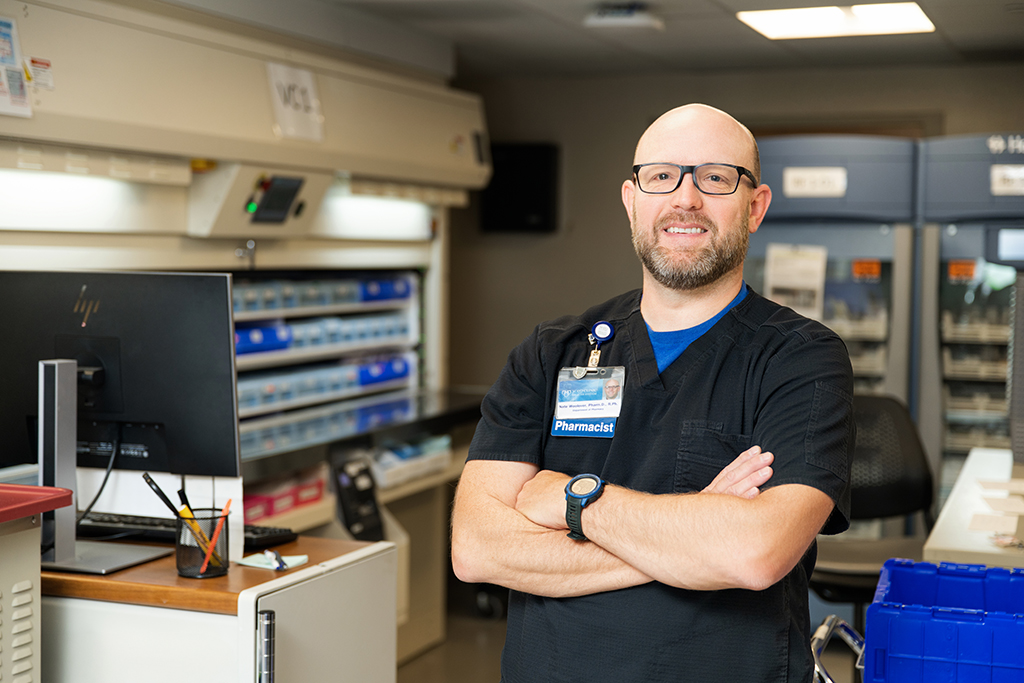
Location: La Crosse, Wisconsin
Employer/Position: Clinical Pharmacist, Mayo Clinic Health System
Claim to Fame: Researching a pharmacist-led screening test for methicillin-resistant Staphylococcus aureus (MRSA) that reduces the duration of vancomycin therapy for infections of the lower respiratory tract
Proudest Moment: Watching his research team’s findings influence the vancomycin prescribing process for other types of infections
Inspiration: “At Mayo Clinic, we often say that the needs of the patient come first. I focus on that as much as I can, especially when I’m working seven nights or seven days in a row.”
Nathan Woolever (PharmD ’18) realized he wanted to be a pharmacist while working as a scientist at the Wisconsin State Laboratory of Hygiene (WSLH). After studying microbiology in graduate school at the University of Wisconsin–La Crosse, WSLH hired him to work on tuberculosis testing, a pursuit that kept him busy for more than a decade.
“There was one patient who’d started TB therapy, their sputum smear came back negative, but then it became positive a few months later. We didn’t think drug resistance was causing it, and their tests kept coming back positive, so we needed to figure out what was going on,” he says.
Woolever began communicating with a hospital-based pharmacist who was a key care provider for this patient.
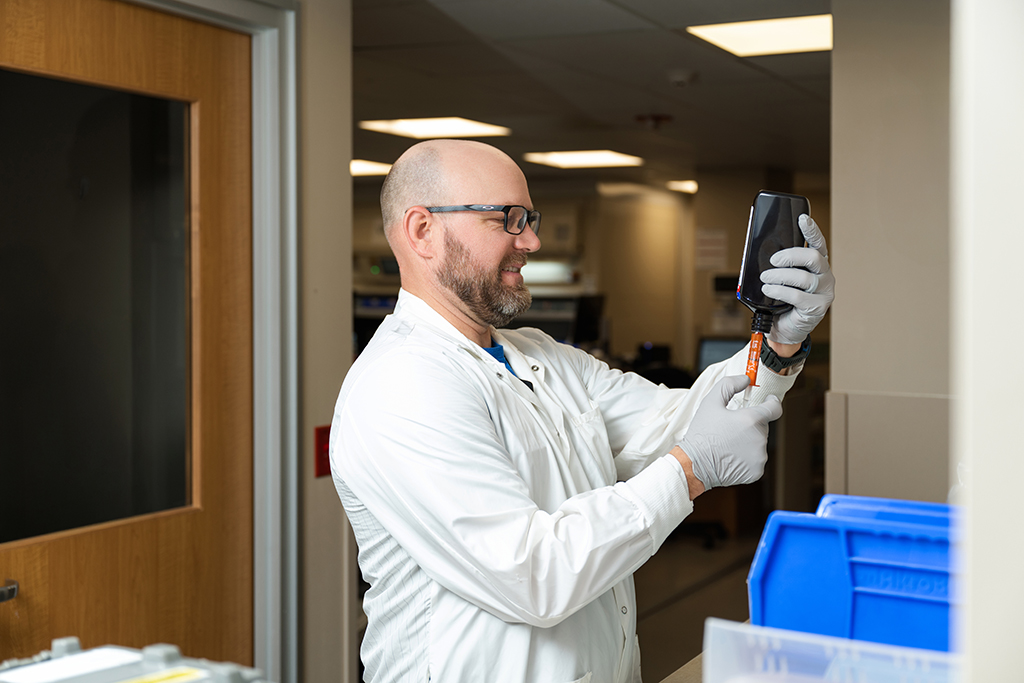
“I realized that pharmacists were doing more than I thought in managing care for patients,” he says. “I also had a couple of friends who were pharmacists. They helped me learn about the breadth of the profession and the different career options I could pursue.”
Before long, Woolever decided to trade the diagnostic realm of patient care to focus on treatment and outcomes. With nearly 40 years of life experience behind him, plus a supportive wife and three kids, he joined the UW–Madison School of Pharmacy’s PharmD program as a nontraditional student.
A residency at Mayo Clinic took Woolever back to La Crosse in 2019, the year after earning his PharmD. It eventually led to a job. In his first year as a full-fledged employee of Mayo Clinic Health System, Woolever assisted an antibiotic stewardship initiative that has since grown into a larger program.
“I handled day-to-day antimicrobial de-escalation with individual patients before moving into the position I’m in now, which involves overnight shifts at the hospital pharmacy,” says Woolever.
“It helps change the culture of antibiotic stewardship and helps providers feel confident in the advice pharmacists give.”
—Nathan Woolever
Woolever works from 8 pm to 7 am for seven days, then recovers during a week off. Next, he works during daylight hours for seven days, after which he takes another week off. Then the cycle begins again. He spends overnight shifts in the central pharmacy, preparing for the next day’s surgeries and infusions, and handling medication delivery logistics for the hospital. During day shifts, he serves as a clinical pharmacist, usually in the intensive care unit or medical-surgical units. This setup gives him lots of time with his family, plus a chance to work in several areas of interest, including infectious disease and acute illness.
Woolver frequently gets to see the impact of research he helped conduct during his residency. His team spent a year and a half studying an intervention that gave pharmacists a larger role in clinical decision-making. Mayo Clinic established a collaborative practice agreement (CPA) that let pharmacists order a methicillin-resistant Staphylococcus aureus (MRSA) screening test for any patient prescribed vancomycin for a lower respiratory tract infection. This polymerase chain reaction (PCR) test was administered with a nasal swab.
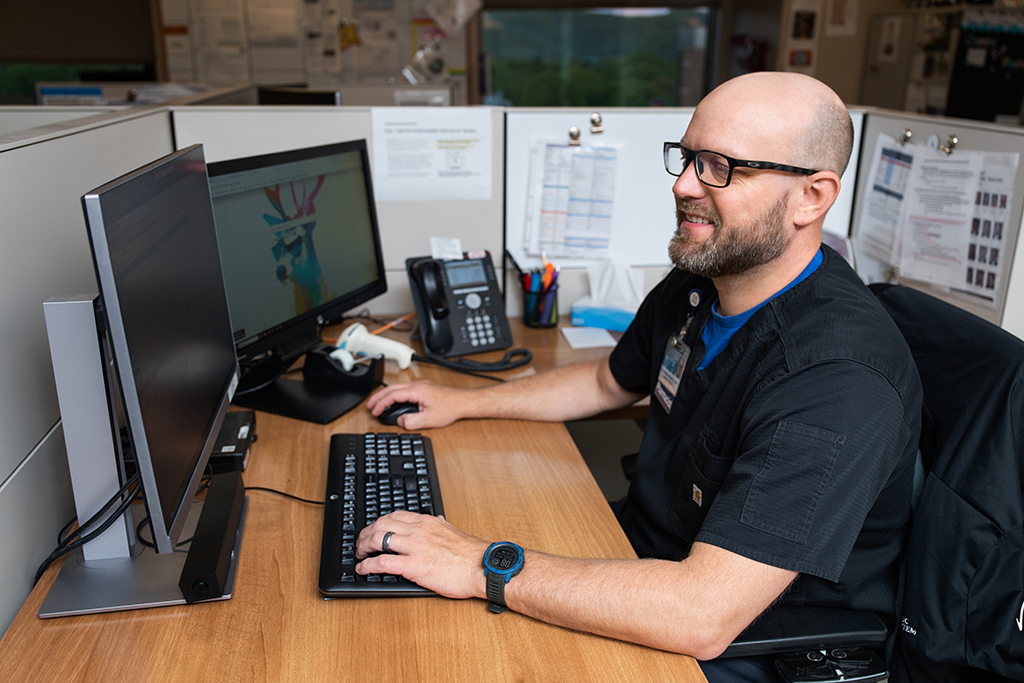
Vancomycin is a crucial treatment for MRSA, but it’s costly and raises the patient’s risk of kidney damage. Therefore, using this antibiotic no longer than necessary is ideal. Before the CPA was established, pharmacists were not authorized to use the screening tool the study investigated. Once they could use it, the average duration of vancomycin therapy decreased, with no ill effects on clinical outcomes. These findings appeared in the journal Mayo Clinical Proceedings in 2020, and they’ve inspired important process improvements since then.
“We now have a best practice advisory in our electronic medical records when vancomycin is ordered for certain conditions. Whether you’re a pharmacist or a physician, it asks if you want to do a MRSA nasal swab,” Woolever says, adding that this intervention is being used and studied for soft tissue infections as well.
Woolever is heartened by the bridges this work has built with physicians, nurse practitioners, and other prescribers.
“Pharmacists aren’t allowed to discontinue a patient’s vancomycin therapy, but I think providers see that we have a valuable role to play in making recommendations,” he says. “It helps change the culture of antibiotic stewardship and helps providers feel confident in the advice pharmacists give.”
Back to top
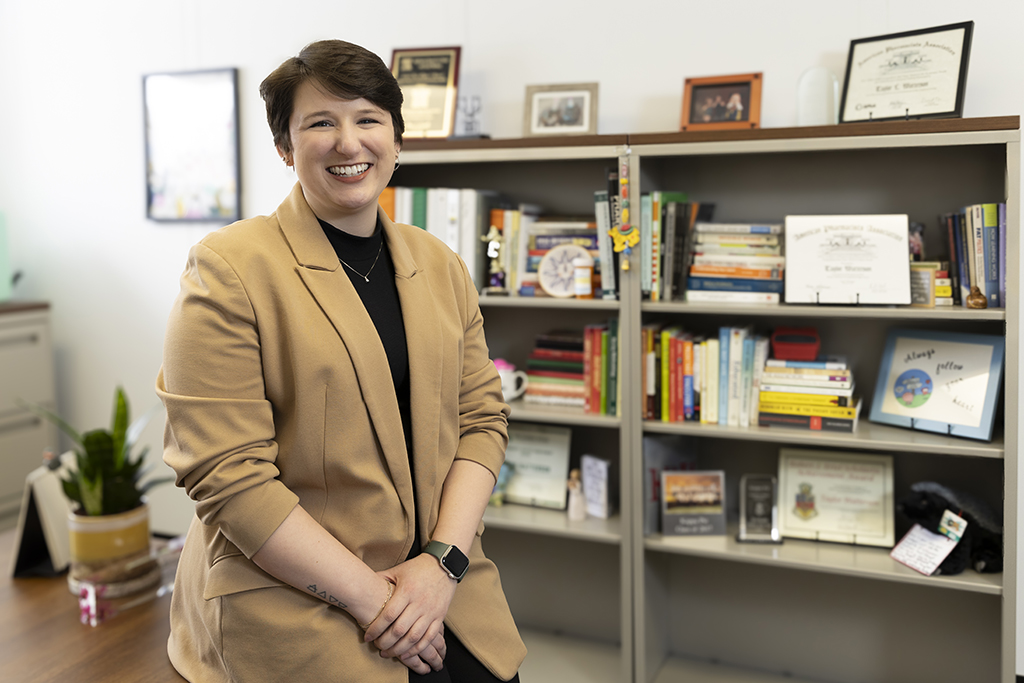
Location: Chicago, Illinois
Employer/Position: Assistant Professor of Pharmacy Systems, Outcomes and Policy, University of Illinois Chicago’s Retzky College of Pharmacy
Claim to Fame: “I’m known as a mentor. Whether I’m working with students, health care professionals, or patients, I do everything I can to help people be the best versions of themselves.”
Proudest Moment: “The day I defended my dissertation. I have that date engraved on a band I wear on my right hand.”
Inspiration: Serving the community by researching patient safety and helping others find their paths.
For Taylor Watterson (PhD ’22), community isn’t just a place. It’s a state of mind. This perspective took shape in childhood as she watched her family members give back to the tiny Pennsylvania town they called home. By the time she was a teenager, she knew she wanted to pursue a medical career. There was just one problem: blood.
“I knew I didn’t want to deal with blood, and I knew I liked going to the pharmacy as a kid, so community pharmacy seemed like a natural fit,” she says.
Watterson worked at Rite Aid while earning her bachelor’s degree and PharmD at the University of Pittsburgh. Content serving on the front lines, she had no idea she’d become a tenure-track professor at the University of Illinois Chicago in 2023.
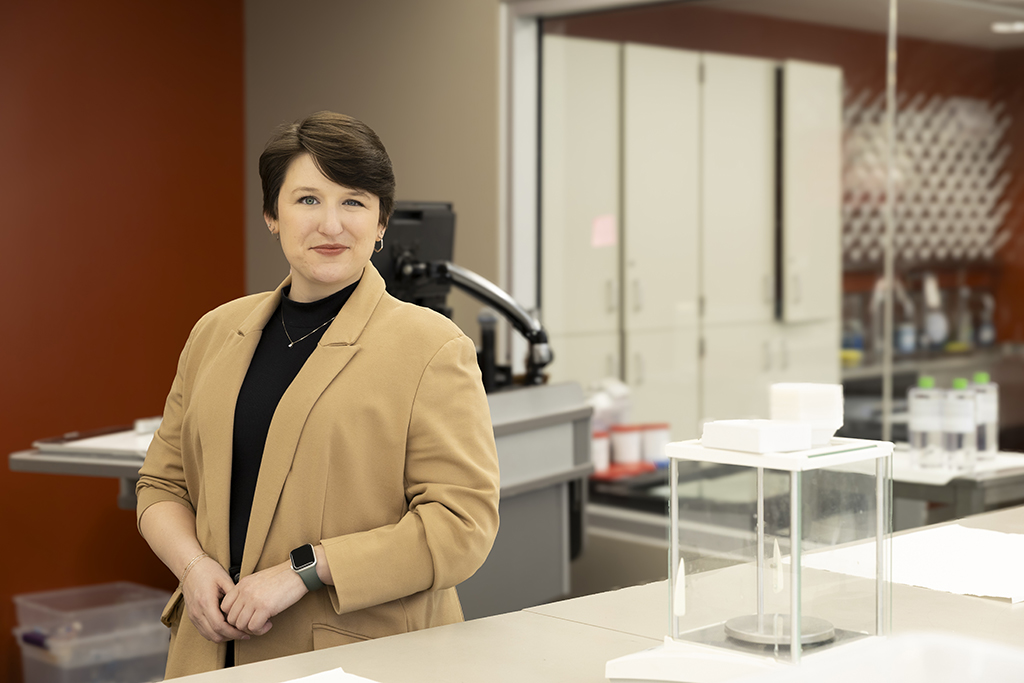
“I thought I’d stay in community pharmacy forever,” she admits. “Then I surprised myself by falling in love with research.”
For a class project as a PharmD student, she investigated how pharmacies could better leverage an important resource: student pharmacists. Exploring ways these future professionals could deliver clinical services felt meaningful. A faculty member noticed Watterson’s aptitude for this work and pulled her aside.
“She said, ‘I think you have a real proclivity for research. You could do this forever,’” Watterson recalls. “I was so happy and surprised that I started crying.”
That kind soul was Olufunmilola Abraham (MS '11, PhD '13), an alum of the School of Pharmacy’s HSRP program and former faculty member, who guided Watterson toward an academic career in health systems research. Now Watterson helps others find new-to-them paths and talents, too.
“As a first-generation college graduate, I take pride in how far I’ve come and want other first-generation students to be able to experience that.”
—Taylor Watterson
Watterson received a Bucky’s Graduate Peer Mentor Award in 2021, after HSRP peers nominated her. In 2024, the Association for Women in Science honored her mentorship efforts with its Motivator Award. Through this organization, Watterson has led small discussion groups for Chicago-area women in STEM professions. She also lends her time to Chicago Scholars, which helps first-generation college students thrive at school and beyond, and she sits on several committees of the American Pharmacists Association.
“As a first-generation college graduate, I take pride in how far I’ve come and want other first-generation students to be able to experience that,” she says. “Working with them is often a matter of listening carefully, amplifying what I’m hearing, and letting them know what doors they can open to access different opportunities.”
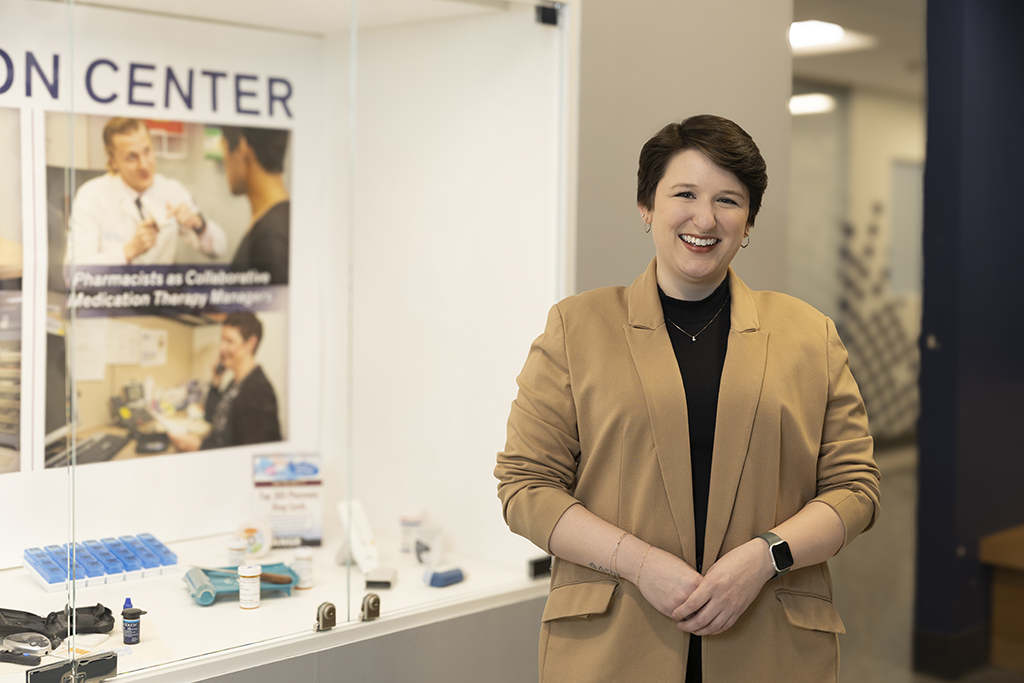
At UIC, Watterson is making a name for herself through research and teaching. When teaching courses about behavior change models and social determinants of health, she helps students learn by building their motivation to expand their knowledge and apply it in ways that matter to them.
As principal investigator in the Systems-Based Collaborative Research for PatienT Safety (SCRPTS) lab, she leads a team that researches medication safety and patient care using a multidisciplinary approach that’s “focused on human factors and the larger systems and contexts in which health care takes place.”
Much of the lab’s work examines how health information technologies shape pharmacists’ day-to-day work and how pharmacist fatigue impacts patient care. Staff are also branching out into other areas.
“Recently we’ve been looking at the distribution of community pharmacies over time in Chicago. There used to be over 1,500 of them within city limits, and now there are less than 500. We want to figure out what that means for patients and the professionals who work there,” Watterson says.
Back to top
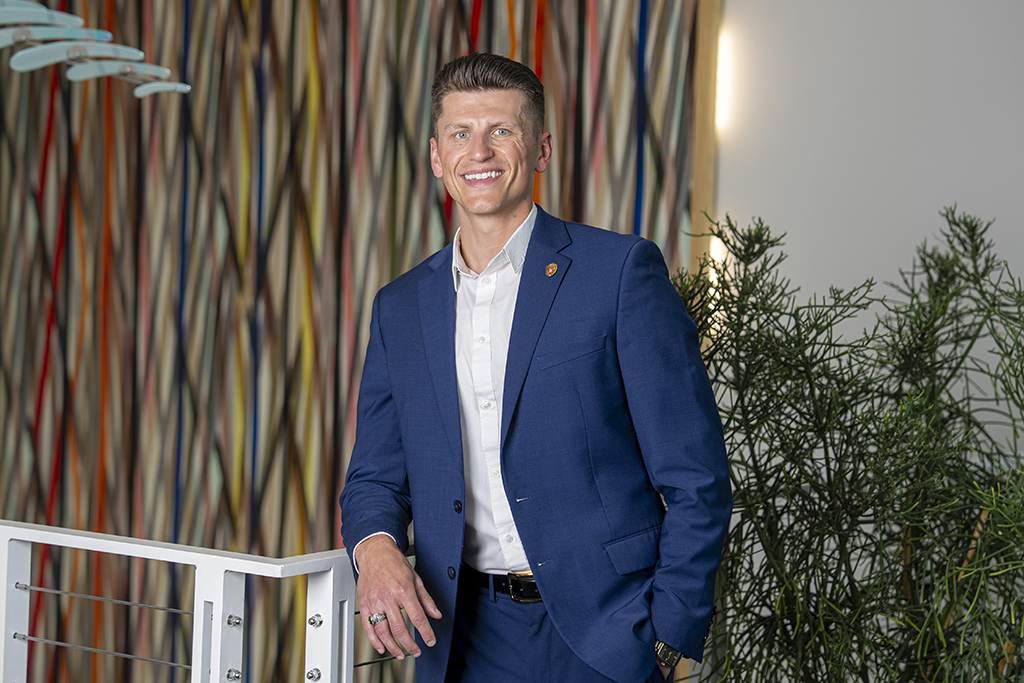
Location: Milwaukee, Wisconsin
Employer/Position: Lead Project Manager, Wisconsin Biohealth Tech Hub
Claim to Fame: “I’m a scientific translator, someone who turns complexity into clarity for a variety of audiences. Legislators, accountants, investors, farmers, and other groups need to know what the scientific enterprise is discovering.”
Proudest Moment: Helping build an economic growth engine focused on personalized medicine in less than a year.
Inspiration: “I come from a small town in rural Wisconsin. People there work hard but don’t always have the best access to medical care or economic opportunity. I want to make sure that they’re part of the innovation that’s shaping the future.”
Chris Unterberger (PhD ’22) knows the residents of Adams-Friendship, his 2,000-person hometown, extremely well. Many stepped up when his family experienced a crisis. The stability they provided kept his childhood from crumbling.
“The community supported me when my family couldn’t. They made sure that I was fed and clothed, and that I got to school on time. I’m a product of their generosity,” he explains.
These caring neighbors also helped Unterberger make his way to the UW–Madison School of Pharmacy. He was drawn to the PharmSci program’s blend of academic disciplines and the opportunity to work in a small lab with School of Pharmacy Dean Steve Swanson and Professor Paul Marker. When he wasn’t in class or researching growth hormone disruptors in the lab, he explored the rest of the Madison community, envisioning career paths that might take him beyond a lab bench. This hope became a reality when he joined the Wisconsin Biohealth Tech Hub in 2024.
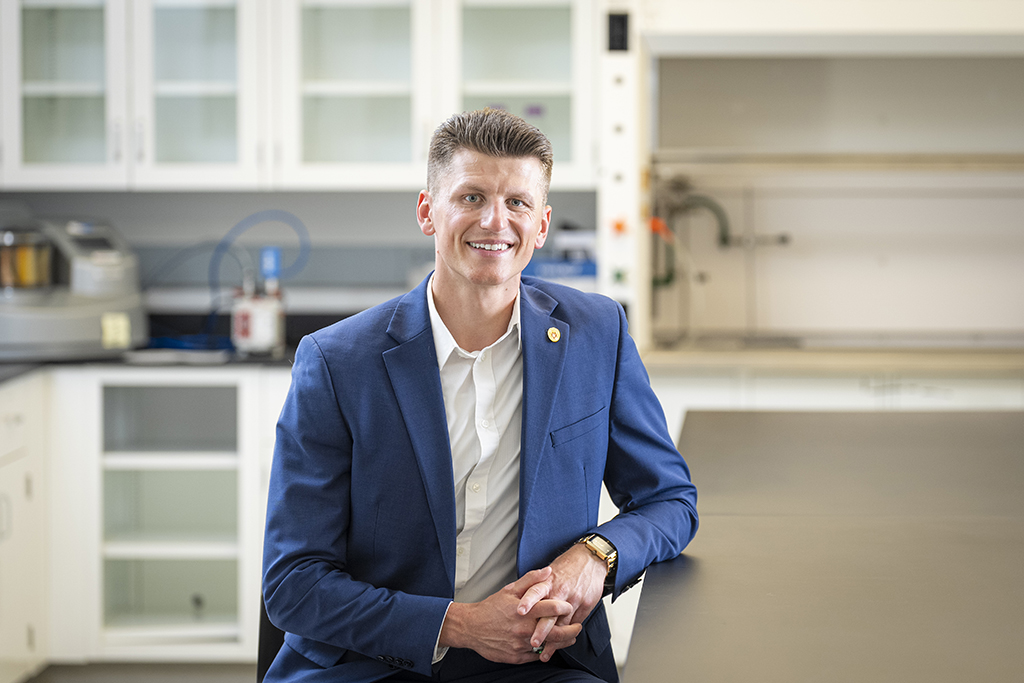
Unterberger says Wisconsin’s future must include everyday people in small rural communities: “It’s about fairness. If something’s being built here in Wisconsin, I want to make sure everyone has a place in it.”
This perspective drives Unterberger’s work at the hub, which fuels innovations in personalized medicine and turns them into economic opportunities. Led by BioForward — Wisconsin’s biohealth industry association—and partially funded by the 2022 CHIPS and Science Act, this effort aims to make Wisconsin a leader in global biohealth technology. As lead project manager, Unterberger wears a number of hats. One involves communicating with potential partners and investors.
“My role weaves together science and strategy, making sure the innovation we’re supporting translates into economic opportunity and health equity,” he says. “Wisconsin stands to gain more than 30,000 jobs in the biohealth space over the next decade.”
“Public policy and innovation too often feel worlds apart. I want to be the bridge […] The future belongs to bridge builders.”
—Chris Unterberger
Unterberger helps potential stakeholders understand how the hub’s projects work and how they could benefit from them. Each of these groups has a different level of scientific knowledge and a different set of goals, so tailoring the message to their needs is crucial. He also encourages them to align with the hub’s mission of lifting as many boats as possible.
“My role requires me to see the forest for the trees, ensuring that investments made by the organizations we partner with are working toward the overarching goal of turning Wisconsin into a biohealth powerhouse,” he says.
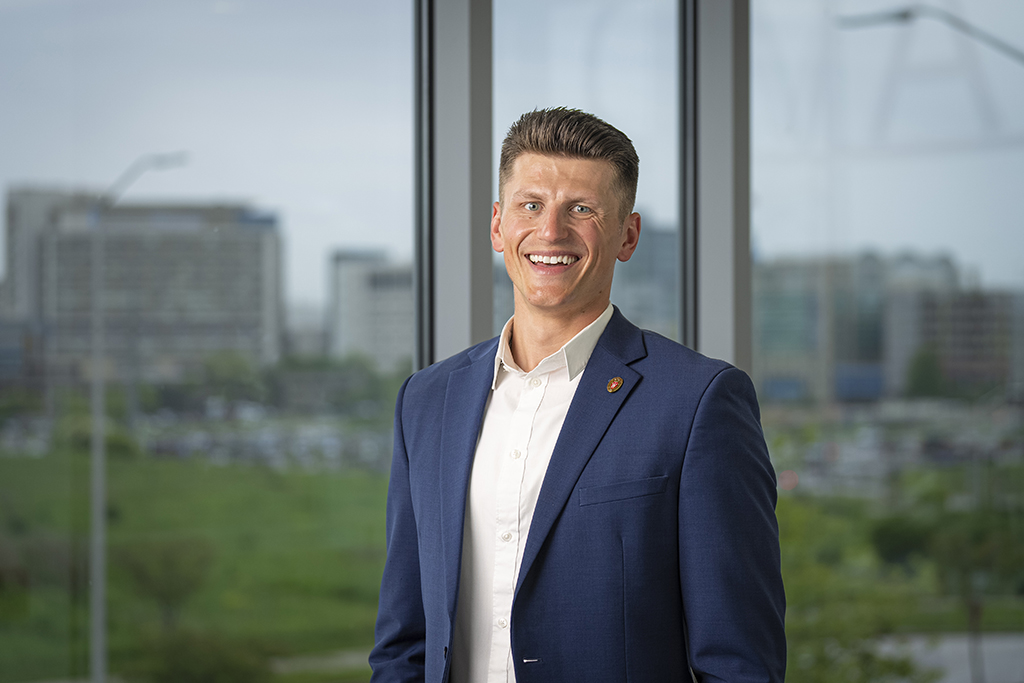
The hub is invested in developing new disease-screening models, leveraging artificial intelligence, promoting data security, and more. Its projects range from developing image-guided personalized therapies to building a statewide health data hub to shrink the cost of bringing new treatments to market. One initiative equips biohealth entrepreneurs with lab space, risk-reduction strategies, and tools for attracting investors. Then there’s Actualizing BioHealth Career (ABC) Pathways, an effort to establish “inclusive talent pipelines that align with employer demands.” It’s positioned to make biohealth jobs accessible to Wisconsin residents from a variety of backgrounds.
“We’re developing career tracks in diagnostics and genomics that don’t require a four-year college degree. This means a lot of small-town kids can become part of this great biohealth movement and get paid well,” Unterberger says.
His passion for building a bright future for rural towns also led Unterberger to run for elected office. He was a candidate for the Wisconsin State Legislature in 2024.
“Public policy and innovation too often feel worlds apart. I want to be the bridge, whether that’s as an elected official or in another role,” he says. “The future belongs to bridge builders.”
Back to top

Location: Boston, Massachusetts
Employer/Position: Director of Pharmacy Operations, Massachusetts General Hospital
Claim to Fame: “If I have a superpower, it’s connecting with people. Fostering connections lays the foundation for strong team culture and is integral to successful collaboration.”
Proudest Moment: “Being recognized as Pharmacist of the Year by the Massachusetts Society of Health Systems Pharmacists this year. Reflecting on all we have accomplished together, I truly view it as an award for my team rather than an individual accolade.”
Inspiration: “The people. Everything I do is for our patients and my team.”
Massachusetts General Hospital is a hub of innovation and inspiration, according to Connor Hanson (PharmD ’19, MS ’21).
“As a level-one trauma center, we care for the sickest patients and support one of the largest hospital-based research programs in the country,” he says. “We are consistently seeking more effective ways to deliver patient-centered care.”
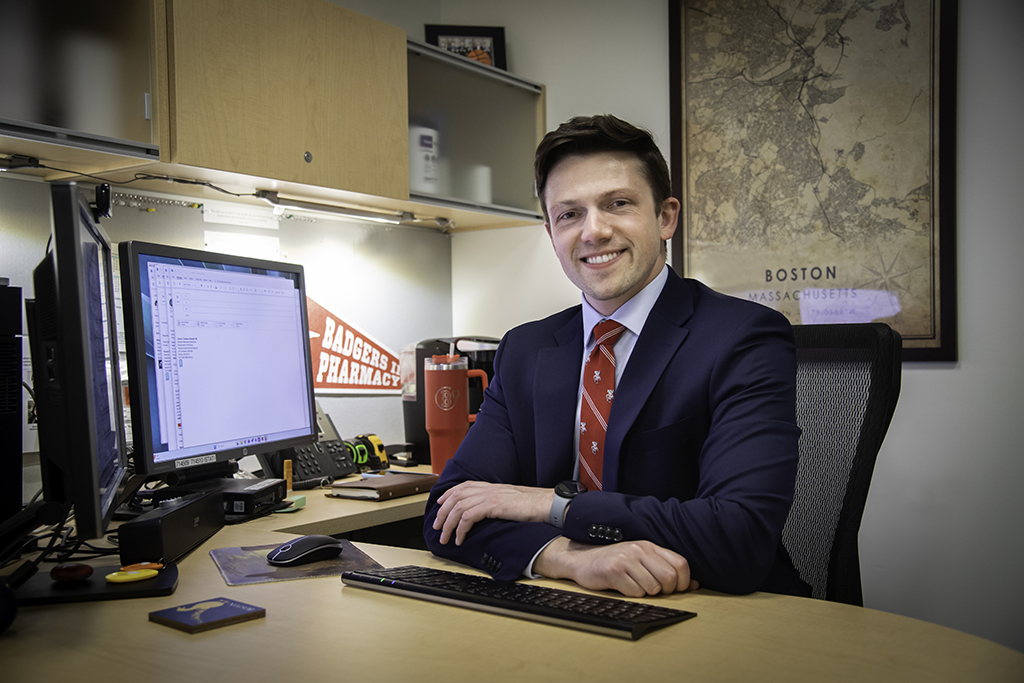
After completing his residency at UW Health in 2021, Hanson managed pharmacy distribution services for Massachusetts General Hospital. He oversaw effective inventory management and medication delivery, building upon his administrative training. He became director of pharmacy operations in 2024, after serving in an interim capacity for several months.
Hanson’s current role has lots of moving parts. He leads teams, improves processes, and drives initiatives to ensure their patients efficiently receive medications. One of his top priorities is developing high-level strategies that “set a course for optimal patient care through effective medication procurement, preparation, and delivery.”
Outside of his HSPAL mentors, Hanson learned leadership skills from various role models, most notably his pharmacist parents. Others outside of healthcare have also influenced his style throughout his life.
“When I was a teenager, one of my mission trip leaders talked about rigid flexibility: adhering to your guiding principles but being ready to adapt at a moment’s notice. This principle helps me oversee a 24/7 operation when unexpected issues come up,” he says.
“Being director of operations wasn’t in my five-year plan. All the credit goes to my team and mentors.”
—Connor Hanson
Hanson also believes in leading by example. For example, when staffing levels dropped, he didn’t hesitate to join his team and serve as a pharmacy technician to fill the gap.
“It can be motivating for a team when a leader contributes in this way,” he says. “These situations can be opportunities to collaborate in new ways and build trust amongst team members.”
A gregarious personality helps Hanson build teams and relationships quickly. Participating in youth theater productions nurtured this quality, which he leverages to cultivate trust with the employees he oversees. Hanson highlights their contributions every chance he gets.

“Being director of operations wasn’t in my five-year plan. All the credit goes to my team and mentors. I can’t think of one thing I’ve achieved that I did without someone else’s support,” he says.
This support network includes committees, such as the Sectional Advisory Group for Frontline Leaders run by the American Society of Health-System Pharmacists. In addition to helping one another succeed as leaders, this group’s members share ideas for supporting the on-the-ground workers they manage.
Hanson is eager to see what’s ahead for his team and for Mass General Brigham as a whole.
“Mass General Brigham recently appointed Melissa Ortega, another HSPAL grad, as its first chief pharmacy officer. She’s setting an inspiring course for the future of pharmacy services and patient-centered care,” he says. “We’re also expanding the footprint of our main campus, so I’m really excited about the future of the people and operation I’m lucky enough to lead.”
Back to top
Recommend a recent alum for our 2026 feature
